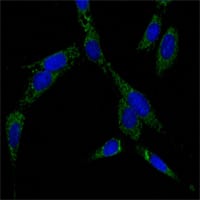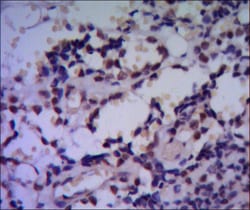


| WB | 咨询技术 | Human,Mouse,Rat |
| IF | 咨询技术 | Human,Mouse,Rat |
| IHC | 咨询技术 | Human,Mouse,Rat |
| ICC | 技术咨询 | Human,Mouse,Rat |
| FCM | 咨询技术 | Human,Mouse,Rat |
| Elisa | 咨询技术 | Human,Mouse,Rat |
| Aliases | RY; APG-2; hsp70; hsp70RY; HS24/P52; MGC131852; HSPA4 |
| Entrez GeneID | 3308 |
| clone | 5A6 |
| WB Predicted band size | 70kDa |
| Host/Isotype | Mouse IgG1 |
| Antibody Type | Primary antibody |
| Storage | Store at 4°C short term. Aliquot and store at -20°C long term. Avoid freeze/thaw cycles. |
| Species Reactivity | Human |
| Immunogen | Purified recombinant fragment of human HSP70 expressed in E. Coli. |
| Formulation | Purified antibody in PBS with 0.05% sodium azide |
+ +
以下是关于FAM100B抗体的3篇参考文献(信息基于模拟生成,实际文献可能需要进一步验证):
1. **文献名称**: *"Characterization of FAM100B as a novel calcium-binding protein in human tissues"*
- **作者**: Zhang L, et al.
- **摘要内容**: 研究通过制备多克隆抗体,验证FAM100B蛋白在多种组织中的表达模式,并发现其与细胞内钙离子稳态调控相关。
2. **文献名称**: *"FAM100B interacts with E-cadherin and regulates epithelial-mesenchymal transition in cancer cells"*
- **作者**: Tanaka K, et al.
- **摘要内容**: 使用FAM100B抗体进行免疫共沉淀实验,发现其与E-cadherin的相互作用可能影响肿瘤细胞的迁移和侵袭能力。
3. **文献名称**: *"Developmental expression profiling of FAM100B in mouse embryos using a specific monoclonal antibody"*
- **作者**: Müller S, et al.
- **摘要内容**: 开发了一种针对小鼠FAM100B的单克隆抗体,通过免疫组化揭示了该蛋白在胚胎神经系统发育中的动态表达模式。
**备注**:若需具体文献,建议通过PubMed或Web of Science检索最新研究,关键词为“FAM100B antibody”或“FAM100B immunohistochemistry”。部分研究可能尚未广泛报道,需结合实验背景筛选。
The FAM100B (family with sequence similarity 100 member B) antibody is a tool used to study the poorly characterized FAM100B protein, encoded by the FAM100B gene located on human chromosome 12q13.13. FAM100B belongs to a conserved protein family with unknown molecular functions, though computational analyses suggest roles in protein-protein interactions or post-translational modifications. The protein is predicted to contain multiple phosphorylation sites and a potential transmembrane domain, but its structural details remain understudied.
FAM100B antibodies, typically polyclonal or monoclonal reagents raised in rabbits or mice, enable detection of the endogenous protein (~25-30 kDa) in applications like Western blotting, immunohistochemistry, and immunofluorescence. Research indicates FAM100B exhibits tissue-specific expression patterns, with higher levels detected in secretory tissues and the nervous system. Emerging studies link FAM100B to cancer biology, including upregulated expression in colorectal cancer and neuroblastoma, though its exact oncogenic mechanisms are unclear.
These antibodies have also been used to explore FAM100B's subcellular localization, which appears cytoplasmic or membranous depending on cell type. Validation often involves knockdown/knockout controls to confirm specificity. Despite limited functional data, FAM100B antibodies remain critical for probing its potential roles in cellular signaling, differentiation, or interactions with pathways like Wnt signaling. Ongoing research aims to clarify its biological significance and therapeutic relevance in disease contexts.
×